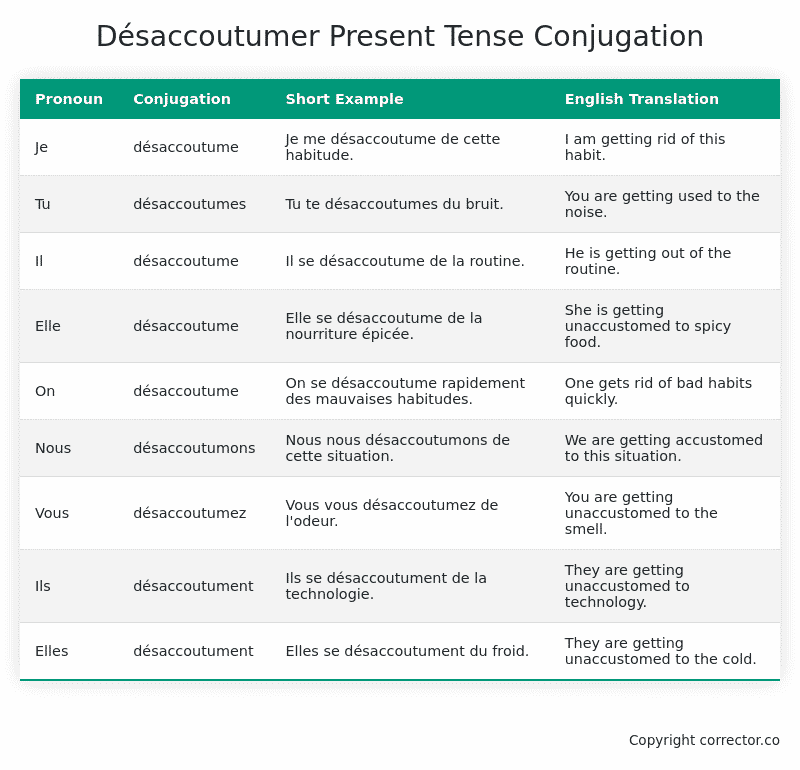Le Present (Present Tense) Conjugation of the French Verb désaccoutumer
Introduction to the verb désaccoutumer
The English translation of the French verb désaccoutumer is “to unaccustom” or “to break the habit.” The infinitive form, désaccoutumer, is pronounced as “day-za-ku-too-may.”
Désaccoutumer is derived from the combination of the prefix “dés-” (meaning “un-” or “not”) and the verb “accoutumer” (meaning “to accustom” or “to habituate”). It is used to express the action of breaking a habit or becoming unaccustomed to something.
Examples of usage:
-
Je dois me désaccoutumer de fumer.
(I need to break the habit of smoking.) -
On ne peut pas se désaccoutumer du confort moderne si facilement.
(We can’t become unaccustomed to modern comfort so easily.) -
Il lui a fallu du temps pour se désaccoutumer de sa vie d’avant.
(It took him some time to unaccustom himself from his previous life.)
Note: As an AI language model, I can provide information and examples, but please note that the examples may not reflect common usage or personal experiences.
Désaccoutumer – About the French Present Tense
To take a deep dive into all the French tenses then see our article on Mastering French Tense Conjugation.
Common Everyday Usage Patterns For Le Present
Interactions with Other Tenses
Table of the Present Tense Conjugation of désaccoutumer
| Pronoun | Conjugation | Short Example | English Translation |
|---|---|---|---|
| Je | désaccoutume | Je me désaccoutume de cette habitude. | I am getting rid of this habit. |
| Tu | désaccoutumes | Tu te désaccoutumes du bruit. | You are getting used to the noise. |
| Il | désaccoutume | Il se désaccoutume de la routine. | He is getting out of the routine. |
| Elle | désaccoutume | Elle se désaccoutume de la nourriture épicée. | She is getting unaccustomed to spicy food. |
| On | désaccoutume | On se désaccoutume rapidement des mauvaises habitudes. | One gets rid of bad habits quickly. |
| Nous | désaccoutumons | Nous nous désaccoutumons de cette situation. | We are getting accustomed to this situation. |
| Vous | désaccoutumez | Vous vous désaccoutumez de l’odeur. | You are getting unaccustomed to the smell. |
| Ils | désaccoutument | Ils se désaccoutument de la technologie. | They are getting unaccustomed to technology. |
| Elles | désaccoutument | Elles se désaccoutument du froid. | They are getting unaccustomed to the cold. |
Other Conjugations for Désaccoutumer.
Le Present (Present Tense) Conjugation of the French Verb désaccoutumer (You’re reading it right now!)
Imparfait (Imperfect) Tense Conjugation of the French Verb désaccoutumer
Passé Simple (Simple Past) Tense Conjugation of the French Verb désaccoutumer
Passé Composé (Present Perfect) Tense Conjugation of the French Verb désaccoutumer
Futur Simple (Simple Future) Tense Conjugation of the French Verb désaccoutumer
Futur Proche (Near Future) Tense Conjugation of the French Verb désaccoutumer
Plus-que-parfait (Pluperfect) Tense Conjugation of the French Verb désaccoutumer
Passé Antérieur (Past Anterior) Tense Conjugation of the French Verb désaccoutumer
Futur Antérieur (Future Anterior) Tense Conjugation of the French Verb désaccoutumer
Subjonctif Présent (Subjunctive Present) Tense Conjugation of the French Verb désaccoutumer
Subjonctif Passé (Subjunctive Past) Tense Conjugation of the French Verb désaccoutumer
Subjonctif Imparfait (Subjunctive Imperfect) Tense Conjugation of the French Verb désaccoutumer
Conditionnel Présent (Conditional Present) Tense Conjugation of the French Verb désaccoutumer
Conditionnel Passé (Conditional Past) Tense Conjugation of the French Verb désaccoutumer
Conditionnel Passé II (Conditional Past II) Tense Conjugation of the French Verb désaccoutumer
L’impératif Présent (Imperative Present) Tense Conjugation of the French Verb désaccoutumer
L’impératif Passé (Imperative Past) Tense Conjugation of the French Verb désaccoutumer
L’infinitif Présent (Infinitive Present) Tense Conjugation of the French Verb désaccoutumer
L’infinitif Passé (Infinitive Past) Tense Conjugation of the French Verb désaccoutumer
Le Participe Présent (Present Participle) Tense Conjugation of the French Verb désaccoutumer
Le Participe Passé (Past Participle) Tense Conjugation of the French Verb désaccoutumer
Struggling with French verbs or the language in general? Why not use our free French Grammar Checker – no registration required!
Get a FREE Download Study Sheet of this Conjugation 🔥
Simply right click the image below, click “save image” and get your free reference for the désaccoutumer present tense conjugation!

I hope you enjoyed this article on the verb désaccoutumer. Still in a learning mood? Check out another TOTALLY random French verb present conjugation!


